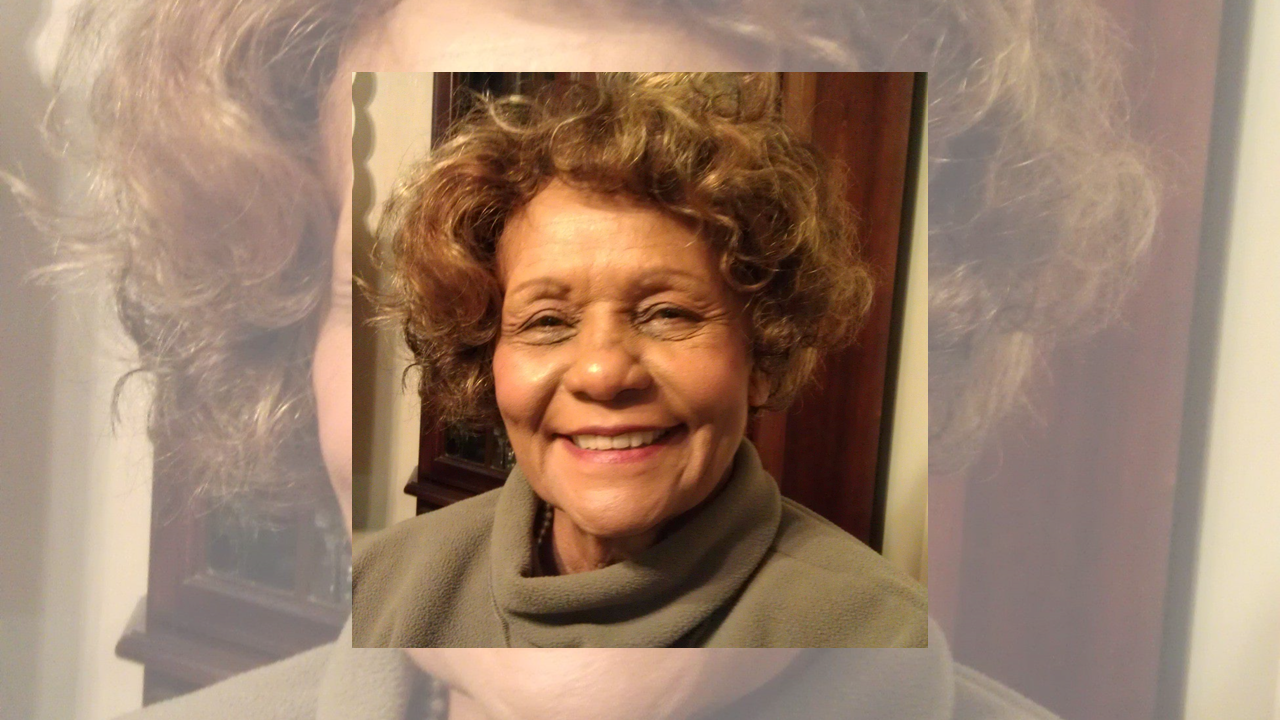Ms. Pearl Jackson Green / contributed
Ms. Pearl Jackson Green wears many hats. No pun intended, but the lady has a hat collection that rivals any duchess. And she has worn many titles in her time. She was among the first black women from Lawrence County to attend college. Although her first inclination was to study science and become a medical researcher, she later changed her major. She earned a degree in education from Alabama State College in Montgomery and went on to teach in the Lawrence County School System for 20 years. At “80 plus” years of age, she is still teaching. People frequently ask her why she continues. “It’s because I might be able to help some young person,” she replies. You get the feeling when talking to her that she is teaching you things that you might never learn from websites or encyclopedias. In essence, Pearl Jackson Green is a walking, talking history book.
This is her story….
The right to vote
Always impeccably dressed, Ms. Pearl made her way down the interior stairway of the Lawrence County Courthouse; the young college graduate was excited to be able to register to vote for the first time.
Her excitement diminished when the registrar required her to say the articles to the U.S. Constitution.
Not many people outside a history class would have been able say them, but Ms. Pearl fooled the registrar, who would have denied her the right to register, had she not been such a whiz at history and memorization.
As she was rattling off these articles with rapid- fire piston precision, a young white man ambled up to the desk to register. When he heard Ms. Pearl giving what must have sounded like a history lesson, he questioned the registrar as to what was required. The older man, seated with other registrars at a long table in the courthouse basement used an unsavory slang word, and pointing to her, explained that he was having her recite parts of the US Constitution so that she could register to vote.
The kind stranger became incensed that the man would insult a woman in such a way. He began to raise his voice in protest and when the registrar became angry and stood, the two came to near blows with the registrar ending up bent backwards over the table, while the tall stranger pointedly expressed his disgust at the useless and totally unnecessary recital.
Someone called local law enforcement officials, who were located across the street at the county jail. The young man was summarily escorted to that facility, but it was only minutes before his bail was posted and he returned to the courthouse to register.
This time, as the young man approached the table, Ms. Pearl was counting marbles in a jar. She would now be required to guess how many were there before she could register to vote. “What are you doing now?” he asked the registrar. “I’m making her guess how many marbles are in this here jar,” said the county official. “Then she has to get this paper signed by three white men and then she can register,” he said.
The young man grabbed the paper, slashed his signature across all three printed lines and flung the paper back into the red face of the man who had finally run out of mundane things with which to entertain himself, and had to let Ms. Pearl register.
Such ordeals were not uncommon throughout the South, but men like the stranger were very uncommon. However, it would be the people who could see through the color of another person’s skin to their character and their hearts, who would make a marked difference in Pearl Jackson Green’s life.
Like the man on the bus (in part one), the young stranger, and many others like them, would live in her mind as ladies and gentlemen of great and good character, honest and unwilling to stand silently by and let people be bullied into submission by those who could not see beyond the color of a person’s skin.
Today, that would have not only been socially unacceptable, but it would have been called racial profiling and been deplorable to most people of any color.
There were others who stand out in Ms. Pearl’s mind. Among them was a young businesswoman who offered high-end clothing and millinery goods in a store called The Dress Shop, located on Main Street in Moulton. Ms. Pearl recalls that she was treated with dignity and respect by the store owner, who would take the time to help her chose perfectly tailored clothing and one of her passions – hats.
“This lady had a room full of beautiful hats,” recalled Ms. Pearl in a speech two years ago at a local library fundraiser. “She helped me pick out hats that would accent my facial features. She taught me a lot about how to carry myself, and how to wear clothes and hats,” she recalled. “I still have that first hat that I bought from her after I got my first job,” she said proudly, holding up a pretty yellow straw hat, its brim tastefully decorated with pastel flowers. “This is the hat. The shop owner was Isabell Cammack. She was a true lady.”
Others who gave her continued faith in her fellow citizens are too many to name, but there are people who saw in her something that her college professor recognized early on – an intelligence, a concern for her community and a desire to help make it a better place.
Passion for teaching
She was hired as a teacher, one of the first black, female teachers in the Lawrence County school system. She credits her college professors with teaching her the correct way to conduct herself in an interview. She was hired by Clyde Horton, superintendent, in 1954.
“You are very impressive,” he told her. “I’ll let you know my decision.”
She was contacted by Supervisor of Black Schools in Lawrence County Schools, O’Dell Sheffield, who came to tell her what time and where to report.
“The vacancy was in Courtland,” she recalled. Dressed in black leather heels and a freshly starched and ironed black and white dotted-Swiss shirtwaist dress, her trademark pearls around her neck, she showed up ready for work on a hot August day. She would be teaching the third grade. “I remember how the parents of these students wanted to be very involved because it was so important to them that their children get an education,” she said thoughtfully.
A milestone event in her life occurred the next year, when on Sept. 3, 1955, she married William Jackson. The couple had three children, Andre, Stephen and Keith.
Over the next 30 years she would influence people like Laurie Lambert Montgomery, who says of her former teacher and mentor, “Mrs. Jackson was my fourth-grade homeroom and English teacher,” said the retired LCHS educator. “I’m not sure I knew then that I would become an English teacher, but once I realized that was my calling, she certainly was one of the teachers I tried to pattern myself after.
“Back then the fourth grade was the first year of middle school,” Montgomery recalled. “Kind of a scary time in some ways. Mrs. Jackson was something of a safe haven. She was a wonderful English teacher, she made learning fun, and she was one of the most considerate teachers I ever had.”
Montgomery remembers how Mrs. Jackson took the time to bring her schoolbooks to her home when she was sick with the mumps. “My mother had just given birth to my baby brother and she called to see what I should be working on. Mrs. Jackson offered to bring my work to my home so that I wouldn’t get behind. She showed that kind of caring concern for all of her students.”
Lawrence County attorney and Chief Assistant DA, Bob Lang remembers how he frequently finished his English assignments early. “She knew I loved to read and would pull me aside and give me some extra work that was ahead of the rest of the class. I saw this as a reward and it made me want to work harder. I have always been amazed that she took the extra time to teach me and keep me interested. She was the best!”
Although it wasn’t her original intention to teach, it became her passion. Because she loved teaching, loved children and wanted to see them succeed, her job was never boring to her, nor to the children who sat in her classroom. This patience to help those who needed her, and her willingness to assist those eager to learn faster, got the attention of those who could promote her talents.
Over the next 10 years she would continue teaching in the LC School System in various capacities, in Courtland, Moulton High School (which at that time was all black) to Moulton Middle, and then was promoted to the central office as federal programs coordinator under the direction of Superintendent Don Parker for another nine years.
Breaking barriers
In 1979, the Tennessee Valley Authority (TVA) and the federal government required the board of trustees of the Joe Wheeler Electric Co-op to provide representation that would reflect their consumers throughout the district, which included both Lawrence and parts of Morgan County. They had notified the manager of the co-op, Kenneth Sharrott, that he needed to find such a person so that the board would be in compliance with government regulations.
Because of her extensive experience with working within a large budget, Ms. Pearl was recommended to fill a newly created seat on the all-white, all-male board of trustees of the Joe Wheeler Electric Co-Op.
Things were still changing as far as equality went – for women as well as for blacks. “The federal government had sent a man from Washington to talk to Sharrott,” she recalled. “The board, which was all white, all male, was under fire to hire minorities, but the board wanted a man. However, they didn’t consider when writing the criteria that they would have to comply if an applicant met those criteria, whose duties would include experience in developing budgets and working with large figures, with which I was very familiar,” she said.
She was the only applicant who met and exceeded all the criteria, having worked for years with federal programs, including writing many grants.
She walked into the first meeting dressed immaculately, as usual, in a navy blue single-breasted suit with a white shirt front and navy heels, every hair in place, ready to get down to business.
These “firsts” didn’t sit well with some of the good ole boys. One of them quit the board on the spot, making no secret of the reason for his departure. The others were cordial but bandied the “n” word and used course language in front of her – for a while.
It was a difficult situation. She knew she was up to it, though, she had been in the presence of people who never disguised their feelings about equality, so this was just another situation where her intelligence and her character and the way in which she conducted herself won out over the temperaments of the others. “I always conducted myself appropriately in any situation,” she said.
“They also wanted their membership to reflect the area where they served, so I was appointed as an ‘at large’ member, in an advisory capacity, but with no voting rights.” She was uncomfortable with the arrangement, but it got her foot in the door. When the time came, she accepted the challenge, and campaigned for a seat on the board; being an elected representative would give her equal weight with the other board members. She won by a landslide.
“There were good people on that board, as well as the ones who continued to use foul language, but the good people there made it worthwhile. There were always and always will be pockets of people whose prejudices are not hidden, but those people were overshadowed by people with the best of hearts and intentions for the people they serve, like Neal Norwood, J.R. Knoff and many others, not only on the board, but in all walks of life.”
In a 1994 area magazine, Joe Wheeler EMC board member Bunk Whitlock is quoted as saying that Pearl Jackson Green has a ready smile, is soft-spoken and is as tough as nails. “You don’t want to back her into a corner!” said Whitlock.
Over the next 30 years she would come to hold all offices of the board, including president and secretary, and was considered a voice for all the people she represented.
In 1982 she was offered a job by the Decatur City School System, which she accepted, while still keeping her seat on the board.
While working in the Decatur school system, she served as principal of Somerville Road Elementary for four years before going into administration where she served as curriculum coordinator of city schools, which gave her the freedom to promote education at another level and allowed her to work under the leadership of Dr. Byron Nelson and Dr. Sam Houston.
She would retire from this position in 1995, ready to take on new challenges. She accepted a position as a consultant with the Zana-Bloser Publishing Company. There she did in-service for language arts teachers all over the United States for the next 11 years.
Ms. Pearl today
In 2009, after serving 30 years on the Joe Wheeler Board, Ms. Pearl retired to enjoy her family. She traveled and did things she had wanted to do for the past 30 years could not because of her commitments to her job and volunteer efforts.
In today’s “Me, too” climate, it is a testimony to her character that Ms. Pearl never encountered harassment of a sexual nature. She attributes that to always being conscious of how she presented herself as unapproachable in that way. However, she was, and is, always approachable to her constituents, who brought their problems and concerns to her. “I would still be sitting on that board as long as the people elected me to be their representative, but at the time there were term limits,” she said.
“It is my dream that we will see more young people getting involved, stepping up and taking the incentive to run for public office and to represent all of the people,” she said thoughtfully. “I envision a unified county that includes all races, religions, ages and all citizens from all over the county.”
Her philosophy on life is that one should do all the good they have the capacity to do, every day. Pray a lot- say something good about someone every day or do something good every day.
Her current goal is to get every single person in Lawrence County to register and vote, no matter which party. She includes emphatically that they will not be forced to say the Articles to the Constitution or guess the number of marbles in a jar…
She continues to support equality for all people. She finally had a chance to walk across the Edmund Pettus Bridge a few years ago, and also had the opportunity to shake the hand of President Barack Obama when he took the walk across the famous bridge. “I waited in line all day to hear his speech and to shake his hand,” she smiled. Her son, Lt. Col. Keith Jackson, was in charge of security for the event. He serves in the Army and is stationed in Montgomery. Needless to say, Ms. Pearl had a good seat.
Accolades
During her career, Pearl Jackson Green was involved in many activities, including the Red Dress Luncheon, a gala fundraising event for the American Heart Association, through her sorority, Delta Sigma Theta, of which she served as the first president.
In 1978-79 she was cited as the BPW Woman of Achievement in Moulton.
In 1987 she was awarded the Certificate of Appreciation for Outstanding Contributions to the Programs for Parents and Children Together.
In 2000 the Lawrence County Chamber of Commerce presented her with its Citizen of the Year Award, citing her commitment and exceptional contributions to Lawrence County.
2008 brought her a well-deserved Lifetime Educators Award for Exemplary service as an educator to the cause of education people of all colors by the NAACP, Lawrence County Unit 5037.
In 2009 she was awarded a 30 Years of Service plaque by the members of the Joe Wheeler Board of Trustees, and another in the same year for 30 years of service on its Board of Directors.
In 1993, the Committee of Elementary Schools of the Southern Association of Colleges and Schools honored Pearl Jackson Green with a certificate of appreciation for her outstanding service.
In 2016, she was recognized as the first black person elected to serve on the Joe Wheeler EMC Board.
In 2017, she was presented with an award as speaker by the Alabama District 7 Board of the Moulton Democratic Party, “In recognition for challenging women on the subject, ‘You Have a Right as a Citizen.’”
She is most proud of her family, and of legacy with the Joe Wheeler Board, and her work with the Decatur City School System. She also enjoys attending Smith Chapel ECM in Moulton, singing in the choir and serving as church treasurer. She currently sits on the board of Christian education and teaches Sunday school for first-third grades.
In 2016, a new scholarship fund was established in her name, created by her fellow Delta Sigma Theta Sorority sisters, who christened it , “The Pearl Jackson Green ‘You Make a Difference’ Humanitarian Award.’” This is what the proclamation stated, in part, about her: “Whereas Pearl Jackson Green has devoted her life and work to securing and advancing the ideals of equality, opportunity and diversity through education and civic associations in Lawrence and Morgan Counties, and because her principled leadership continues to serve as profound inspiration and motivation to educators and mankind throughout Alabama and the nation, and because, regardless of their race, creed or color, are the beneficiaries of her extraordinary contributions and sacrifices in the field of education and civic associations, she is without peer a renowned leader.”
Ms. Pearl has sought to lead by example. Her former fourth-grade student, Moulton Water Department Superintendent, Greg Dutton had this to say about her recently: “Ms. Pearl made us want to learn, just by talking to us so that we could understand. She could talk to anyone on any level, from a president to the most uneducated person, and never make a difference. She never talked ‘down’ to anyone,” he said thoughtfully. “She made me want to be a better person. She made me strive to be like her.”
Even though her life was put in danger on several occasions, she always fearlessly stood her ground and never wavered in doing what was right, nor did she let people think she was a pushover. She survived because of her wits and her ability to remain dignified, even under the worst of circumstances.
Ms. Pearl holds no animosity toward anyone for any reason. Not even when crosses were burned on her lawn in the 60s, nor when shots rang out in the darkness, coming through the front door of her home, waking her and her husband, William Jackson, from a deep sleep. She remembers trying to shield her children from it, so that they would not be victims of the vicious cycle of hatred that some families pass from generation to generation. She never held a grudge against an entire race of people for what one or a group of people said or did, nor did she align herself those who reacted violently. She has always been a quiet but effective voice of reason when others shout.
“Why should I hate a whole race of people because of what a few did? I have had so many people make kind gestures to me which I will never forget. I hope no one would ever hate me or hold a grudge against me because of what some other person of color did in another time and place. That doesn’t make any sense,” she said, shaking her head.
To say that Ms. Pearl has seen the world literally change in her lifetime is no small statement. She continues to teach at the Judy Jester School in Moulton, where she finds the good in people and experiences the joy of teaching every single day. “I want all of the kids I’ve taught and the ones I’m teaching now to be all that they can be,” she said sincerely. “And I want to thank those students, and everyone else who has helped to shape me the into person I am today,” she said humbly.
“This has been good for my students. They are constantly asking me to tell them more about those days, eager to learn more about that history,” she said. “You know, when you’ve lived as long as I have, you have a lot of stories,” she laughed.
Note from the author: It has been an honor to tell this story…thank you for sharing, Ms. Pearl, for loving our community, its people of rainbow colors, our children and all the lost and abandoned dogs that find themselves in your care. You are a treasure, and your life is an example for all of us.
Copyright 2018 Humble Roots, LLC. All Rights Reserved.
























